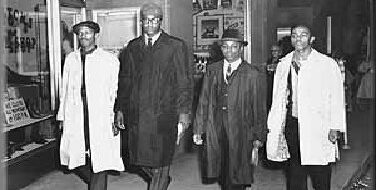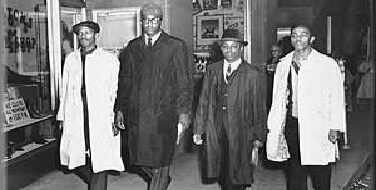
September 6, 2025
The Greensboro Four collectively helped to change the course of American history when they conducted a sit-in at a Woolworth’s lunch counter.
Joseph McNeil, one of the Greensboro Four, a group of students enrolled at North Carolina A&T University who engaged in what is recognized as one of the seminal non-violent protests which marked the beginning of student involvement in the civil rights movement, died on Sept. 4 in a New York hospice care facility. McNeil was 83 years old.
According to The New York Times, his widow, Ina McNeil, indicated that the cause of his death was Parkinson’s Disease.
McNeil and Franklin McCain, Ezell Blair Jr. (who would later be known as Jibreel Khazan) and David Richmond collectively helped to change the course of American history on Feb. 1, 1960, when they approached the counter to order coffee at a downtown Woolworth’s in what was initially a local protest regarding the chain’s policy barring Black patrons from being waited on at the lunch counter.
As he told Newsday, Long Island’s newspaper, “What we did, we thought was the right thing to do to clear up a wrong. This was not in the days of the water hoses or dogs. If there was violence, it was the pushy style; things being thrown, cigarettes being thrown onto clothes, attempts at physical intimidation, verbal harassment. We stayed because we did not just want to win the battle. We wanted to win the war.”
What initially began as a somewhat unpopular protest locally quickly morphed into a full fledged movement for justice, their initial protest was soon joined in solidarity by a group of white women students from what is now the University of North Carolina-Greensboro. Only a few months after their protest, students across the South began using the Greensboro Four’s protest as a model.
By the end of April, over 50,000 students in 54 cities across eight Southern states had engaged in their own protests, and six months after the initial protest, Woolworth’s desegregated their lunch counters, offering equal service to all who patronized their stores.
According to David Garrow, a Pulitzer Prize-winning historian of the civil rights movement, the work of Rev. Martin Luther King Jr and others who built a national movement during that decade are owed to the Greensboro Four for kicking off the Black freedom struggle of the 1960s.
It was “those four guys on Feb. 1 who really do set the Southern Black freedom struggle of the 1960s,” Garrow noted.
He continued, “It kicked off a phenomenal, regionwide movement of Black college students against segregated public lunch counters, and it led, very directly, very quickly, to the phenomenal meeting in Raleigh that created (the) Student Nonviolent Coordinating Committee.” (SNCC)
As the New York Times noted, it was the brief time that McNeil spent in the North, where the oppressive system of Jim Crow, rooted of course, in the Southern system of enslavement, was absent, that made living under that system incompatible with his desire for freedom.
Instead of staying with his family, who moved to New York when his father got a job with an electrical company in Queens, McNeil chose the South, electing to live with an aunt in Wilmington, North Carolina.
On the 30th anniversary of the sit-in, McNeil was asked by a Greensboro reporter about the courage it took for their group to stand up to Jim Crow. He responded that it took a great deal of courage.
“In hindsight, a heck of a lot,” he told the reporter. “I don’t think we were as naïve as some folks have suggested. There were uncertainties. I think we had a sense of resolve, and I think it took a lot of courage.”
After his graduation from North Carolina A&T in 1963 with a degree in engineering physics in tow, McNeil served six years in the Air Force, which saw him serve aboard the KC-135, a refueling plane, during the unpopular Vietnam War.
While stationed in South Dakota, he married Ina Brown, a quilt maker, who is of Lakota heritage, following his service, the two settled in Hempstead, New York, on Long Island.
Eventually, he retired from the Air Force in 2000 with the rank of major general. Notably, he also worked for the Federal Aviation Administration, where he was placed in charge of the flight standards for several of the department’s regions.
Among the Greensboro Four, McNeil was preceded in death by Richmond and McCain, the former in 1990 and the latter in 2014. He was also preceded in death by his son, Ron. In addition to his widow, McNeil is survived by his sons Alan, Joseph and Frank; a daughter, Jacqueline Jackson; seven grandchildren; and four great-grandchildren.
RELATED CONTENT: New Orleans Marks 65 Years Since School Integration By Honoring the Courage Of The New Orleans Four





